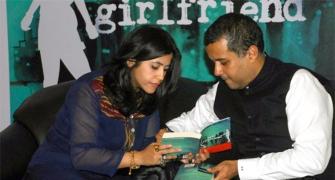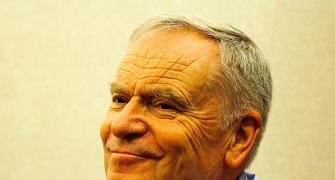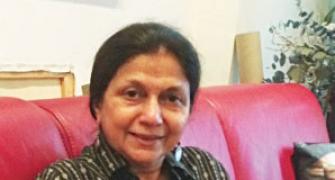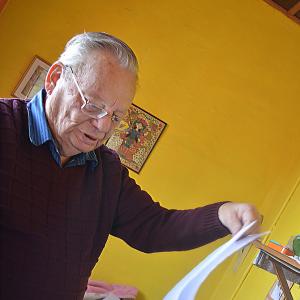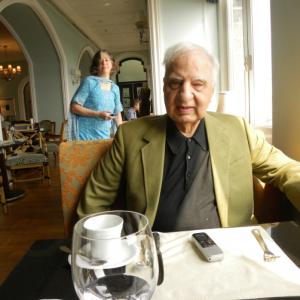How do you translate a first love into a profession? How do you become a writer once you set your heart on it?
Susmita Bhattacharya, who once worked as a graphic designer in Mumbai, now teaches the basics of English to newcomers to Britain and is also a creative writing tutor. Her first novel The Normal State of Mind was published this year after a grim battle with cancer.
Illustration: Dominic Xavier/Rediff.com
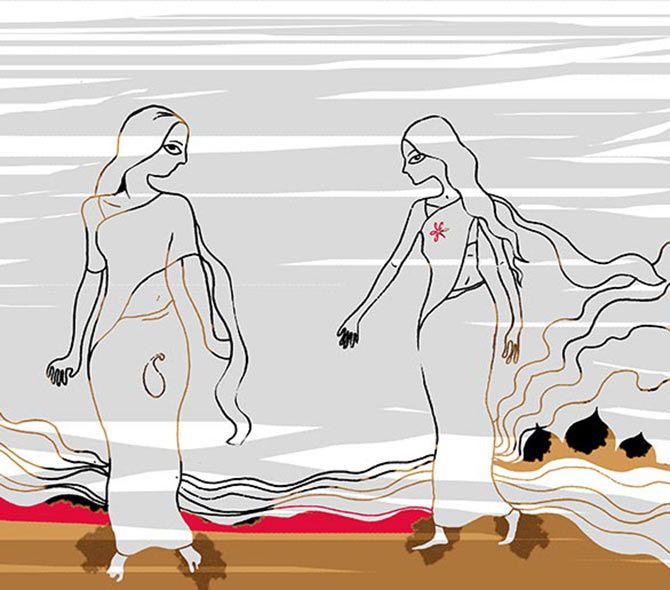
When Susmita Bhattacharya -- then Das -- first started sending in chatty travel pieces to Rediff.com, writing was a hobby.
Something that she had a wistful penchant for. A diversion that occupied her time off, while working at Mumbai design firm Omega Interactive Services as a graphic designer.
Seventeen years later, when Vaihayasi Pande Daniel/Rediff.com caught up with Bhattacharya, she had switched countries; swapped professions; gained a husband, two daughters and a black and white cat named Karishma; fought a tough battle with cancer; added another degree behind her name and is a published author.
Her first novel The Normal State of Mind was published this year by Parthian, an independent publisher based in Cardigan, Wales.
Writing is now a craft. Her art. And Bhattacharya's line of work too. It is a subject she teaches in England.
Bhattacharya works part-time, teaching the basics of English to newcomers to Britain and is also a creative writing tutor. She makes the most of her time -- when daughters Rohini, 9, and Mihika, 4, are at school -- getting her writing done. She says she doesn't have a special room to write in -- "a poky little corner in the dining room, overflowing with books and paper, and general clutter, and I type on an old, slow, time-consuming laptop. I hope to upgrade some day, but until then..."
How did she do it? How do you translate a first love into a profession? How do you become a writer once you set your heart on it?
No, it isn't magic. Or that much vaunted inspiration. Simply tireless work, says Bhattacharya.
The Normal State of Mind is a well-paced, richly-hued novel -- boasting 'brisk, uncluttered' language as a reviewer put it -- with its heart very much in Bombay. Not necessarily Mumbai. Even if its motif is universal.
It puts you in touch with the most bewitching, but understated, face of the city and its folks, that most of us, who might be reading this interview, know very well and are especially comfortable with. That ordinary but solid Bombay we love. In effect, Bhattacharya's novel is about our lives -- if you have ever lived in this maximumpolis -- even if the characters march, perhaps, at times to a different step.
The Plymouth-based author -- whose husband Syamantak lectures on international shipping and port management at Plymouth University -- explains that she wanted the premise of the book to be something she was familiar with, set in a contemporary India, and about the predicaments and tribulations young women of our country face, told through lives of protagonists Dipali, a widow, and Moushumi, a closet gay.
Kolkata, which also features at the start of The Normal State of Mind, is also a place Bhattacharya is acquainted with, in a more detached way -- the city she went to every summer to for her holidays as a child and where she lived briefly after marriage.
Says the book's blurb: 'In the midst of communal riots, India too has to make her own decisions about which traditions she must keep, and which she ought to let go... At the end of it all, who can decide what is the normal state of mind?'
Bhattacharya, who enjoys reading and dabbling in the kitchen -- "cooking Indian food for friends and hosting dinner parties with Indian food and a Bollywood film for my non-Indian friends" -- also loves visiting schools to talk about writing and encouraging young people to read and explore creative writing.
The Normal State of Mind took her eight years to write. Just as it was ready for publication and she was going through the final edits, she was faced with a cancer diagnosis. In that "normal state of mind" Bhattacharya drove herself and pushed ahead valiantly and launched her book.
Your novel is set in Mumbai, in the period after the demolition of the Babri Masjid in Ayodhya and during the Mumbai riots and the Mumbai blasts. The parts about the riots and blasts must be what you remember first hand. Those must have been formative events in your life.
The Mumbai riots and bomb blasts (that I talk about) in the book are all very personal experiences. My parents' home is not far from the locations of two of the major bomb blasts. Those incidents have been seared into my brain, I suppose.
I was in college that Friday. My friend and I were returning home, on a bus, to have lunch together at my place. Soon after we got home, we heard a big blast. We thought it was a firecracker going off, and didn't make much of it.
Then there was another one, closer to home. The building shook. The window panes rattled. The smell of gunpowder seeped in. This time we knew it was more than just a firecracker. But in those days we didn't have mobile phones. Or the Internet. So we didn't really know what was happening until a family friend came rushing in to check if we were all safe. He told us that bombs were going off in different parts of the city.
To our horror, we realised we had been at the spot where the last bomb had gone off, near the Shiv Sena Bhavan. Our bus had been stuck at the traffic light for some time (there), just ten minutes before the blast. It was a near miss. My sister and mother were in school, and my dad walked all the way to school, past the bombed sites, walking over shattered glass and debris, to escort them back home.
Those couple of hours when he went to get them were the most traumatic hours for me, not having contact with them, and praying they'd get back home safely. It still gives me the shivers.
At that point, I don't think I realised what impact it had made. But it sat there -- at the back of my mind -- until the opportunity to write about it arose.
Any examples of the research that needed to be done to lend accuracy to your novel? You thanked your sister for helping you with the Mumbai research. What did the research entail?
My sister Ronjita encouraged me to keep writing and believed in my book. Whenever I visited, we talked through various situations in the book, whether they were credible or not. We went on several recces together, sampling the street food mentioned in the book, following the routes my characters take, checking landmarks, distances, travel time.
She read through a few drafts and gave me inputs as well. After the book was published, she helped a lot with the promotions. So yes, she has been a great help in many different ways.
Why did you choose the Mumbai riots and the blasts that followed as the setting for your book? Why that period particularly?
It was not a conscious decision. But rather a natural one. When I decided to write a novel for my dissertation on my Master's course at Cardiff University, I needed to set the story in a place, at a time that meant something to me.
Writing a novel is a daunting task. Writing the first novel even more so. I wanted it to be something I would be passionate about and write from my own experience (making) it as authentic as I possibly could.
Like I mentioned earlier, the riots and the bombings affected me -- like it must have affected everyone who experienced it --and as I writer I was able to express my feelings about those experiences.
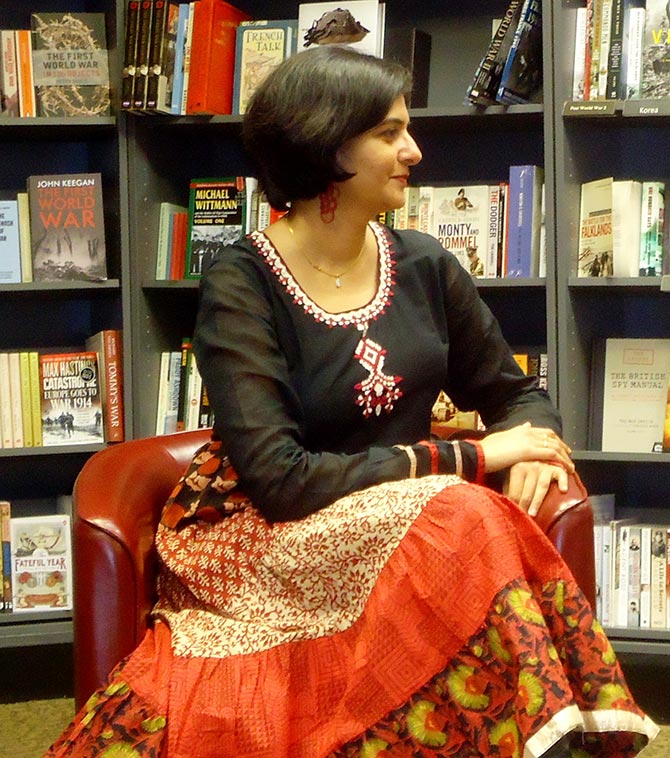
Tell us what kind of Bombay person you are. What of you as a Bombay person is in the book? It is also a pretty Bong (Bengali) book. What of you as person, period, is in the book?
That's a very interesting question: What kind of a Bombay person am I? I was born in Bombay and spent my youth, right up to my marriage in this city. There are so many aspects of me in this book.
I think my friendships with strong, interesting women have been reflected in my book. Life in a middle-class upbringing, the power and headaches of real estate in Mumbai, have all been personal experiences, which I have drawn upon.
I think my parents' open-mindedness in bringing up two girls, without any discrimination, and giving us freedom to live our lives as we wanted has been a gift I will be thankful for every day of my life.
I've had the opportunity to travel, work, discover life, have meaningful friendships, face heartbreaks and learn from these experiences, to have an interesting past to look back on!
Mumbai gave me the opportunity to make friends with people from all walks of life, diverse communities and also opened up so many avenues of interest. My interest in music, art, film and photography all stemmed from the busy social calendar that the city provides.
I had friends in school who were from the film industry. And was (also) friends with the house help in the building -- we all played cricket together along with friends.
I was apprentice to a fashion photographer and mingled with designers and models, but also worked on projects in (slum neighbourhood) Dharavi and with CRY. I attended Indian classical music concerts featuring (tabla maestro) Zakir Hussain (and so forth) and also rock concerts of Bon Jovi etc.
Where else would I get to stride across two completely opposite worlds?
We weren't overtly a Bong family. We were more Bombay people than Bong, because my father was born and brought up in Bombay. In fact, we lived in the same house he grew up in and went to the same school and had friends from different communities. I would consider myself a Bombayite first and then a Bong.
When I left Bombay, I got very homesick. The city featured in all my dreams! So I guess I had to write about it to cure my hangover and homesickness.
What's your stance on most issues that shape the book? What are your influences that are visible in the book?
I feel very strongly about the position of women in society. I found Kolkata to be much more conservative than Mumbai. So I wanted to probe deeper and discover another angle to Kolkata, which I do through Jasmine and Moushumi's characters. I wanted to explore these issues around women, so the study of widowhood and family dynamics.
But I didn't know much about lesbianism. I had never even thought about it while living in India, to be honest. I had a few gay friends and colleagues, and was very comfortable with them and the idea of homosexuality while growing up, but I had not encountered a lesbian ever. When I moved to the UK, I met women who were lesbians.
What astonished me was that even in the West, they were sometimes subject to discrimination and homophobia and fear. I always thought that was the problem of the East. This intrigued me and I wanted to research it, and write about it.
It was exciting to find out more about things unknown to me, and create a world, discover a world that I had not known before.
What lead you to explore a gay theme and that too in a first book? It must have been tough to research that. How did you go about understanding the emotions?
It was not tough to research the LGBT issues in the book.
At first, when I took it on, I thought it would be tough. But eventually, I came to understand that love is universal. It doesn't matter what your sexual orientation is -- what people want out of their relationships is security, caring, friendship, comfort, compatibility and companionship. I don't think that changes in any relationship.
What was difficult in the research was getting access to women, who could trust me, to speak about the LGBT scene in India, their problems, issues etc. But then I approached Shobhna S Kumar, founder of Queer Ink (Queer Ink is a social enterprise to make accessible resources on the lives and issues of the LGBT community). She was very forthcoming and her input was extremely valuable, especially in the context of LGBT issues in the city.
I spoke to many friends here in the UK, and interviewed women in same-sex relationships, and found many commonalities in ideologies and emotional states, coming out stories, the apprehensions, and also the positive aspects of being able to live the way they wish to.
While writing the book, India made amendments to Section 377 of the Indian Penal Code, first in 2009, declaring sex between two consenting adults unlawful, and then overturning this judgment in 2013 (and the court declared amending or repealing Section 377 should be Parliament's decision) making it an offensive act once again.
I followed the news, and realised that it affected me personally, as it was affecting my character too. Moushumi was alive for me, and I walked with her, when she decided to protest against this prejudice against the LGBT community.
Tell us about the inspiration for the various characters in your book. Bits and bobs from different people you know came together to make a character? How did you get into the feel of what it is like being a young widow in an Indian city and to then be able to write about it?
This book took several years of writing. The characters went through several changes -- in their personalities, their life stories. Many characters came to life but then had to be taken away as they didn't fit into the story anymore.
I suppose there is a bit of me in both the lead female characters. But as a writer, one must be observant and, I suppose, years of observing people helped me to create characters I was happy to live with for the ten years I spent with them.
It is possible that the young widow I created was too much of a wallflower, and today's woman isn't necessarily like that, especially an educated, career woman living in urban India. But I couldn't change her character, because that is how she was and I wanted to build up to her being independent and fighting for her rights in the end.
That is how I imagined her and that's how I portrayed her.
I noticed you had no glossary at the back of your book and also did not make any special efforts to explain Bombaya lingo, be it Jamuna-Ganga or Doordarshan or Goregaon or channa sheng. And this is not an India-published book.
Is there the the thinking that people will figure it out? In some ways that made it a very comfortable familiar read for me, but might make it very exotic for those not familiar with the Mumbai milieu.
I did not want to give explanations to the Bombay references I was making in the book. My editor backed me up on that. The idea was to let the reader have the flavour of the references, instead of detailed explanations which would ruin the pace and feel.
I didn't think it lent an exotic feel to the book. Did it? I hope it didn't, because I consciously wanted to portray Mumbai as I had experienced it. I was as honest as possible about being true to the city in my narrative, without relying on the exotic.
At the time of writing, I didn't realise there was so much reference to food in the book. Of course, I should have, as I am such a foodie!
My non-Indian readers had some encouraging feedback, mostly they enjoyed the book. It has got some good reviews in the West. But they did mention that it would have been nice to have a glossary for the food, as it sounded too delicious but they weren't quite sure what it was!
So I ended up giving a talk at the museum about Indian food, and had some recipes on hand. I have included them on my blog as well for people to have a look at. A lesson for the next book!
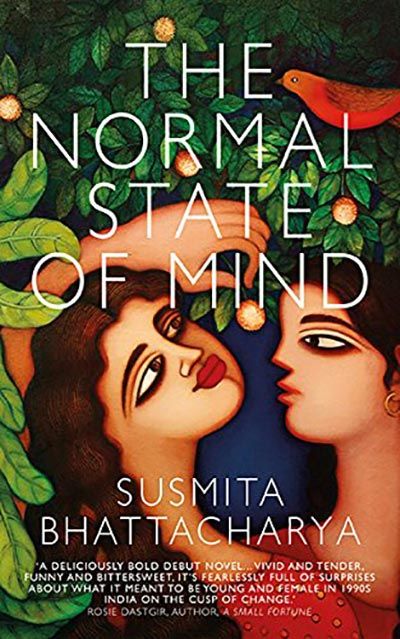
Can you tell us about your journey from being the budding writer you were, when you were living in Mumbai, before your marriage, to now a published author? How did you work at your craft? What is it that keeps on improving it for you?
What were some of the most valuable tips, methods and teaching on writing you learned from? How did you reach a stage where you developed that 'brisk, uncluttered' style that Martin Freeman of The Herald (a Plymouth newspaper) very aptly refers to?
I have always been writing, for as far back as I can remember. Writing and art were my childhood passions. I loved writing adventure stories and illustrating them as a child.
I was extremely fortunate that I had an excellent English teacher in school, who encouraged not only the art of writing, but the skill of reading productively as well.
Mrs Brendish opened up a world of books and access to beautiful language and stories. My first little story was published in (Mumbai afternoon paper) Mid-Day when I was about nine or 10. It was something to do with (astrologer) Bejan Daruwalla and the art of prediction! I don't remember the name.
I wrote diaries through my teenage years, jotting down all the teenage angst helped me write poetry (cringe-worthy, but then any writing is better than none at all!)
After getting married, I sailed for a few years with my husband on oil tankers, and that gave me a fantastic opportunity to keep writing and painting, and travelling. But even at that point, I wasn't serious about writing as a career. It was my passion, my hobby.
After moving to Cardiff, Wales, I enrolled in an evening creative writing class, just to pass time doing something I enjoyed, while hubby was working hard at his PhD. Again, I was very lucky to have an amazing tutor, who really got me, and what I had to say.
She encouraged me to write, write, write, and suggested I go on to do a Master's in Creative Writing.
So I applied in 2005, and it was one of the best things I had ever done. Not only was I learning all about writing as a craft, I was walking, talking, breathing books and writing. I met some people, invaluable friends for life, who inspired me and are brilliant writers themselves. The lecturers on the course were inspiring, and I have a lot to thank them for believing in me.
I wrote a lot, read a lot, submitted a lot of short stories, learnt from the rejections, celebrated the publications. I think I have been very committed and passionate about writing because I really enjoy it.
The only piece of advice I would give aspiring writers is not to give up, be passionate about writing, and keep writing.
My style has changed so much from when I started. I am much more confident about my writing skills now that when I started about ten years ago.
But it is an ongoing process, and there is always room to improve.
And when you teach your students creative writing what are some of the most important things you say to them?
One important factor is to love writing, and in a workshop setting, never to start with a negative excuse to your writing. Don't start reading your work to others with an apology: 'Oh this is really bad.' Or 'I'm not sure if this is any good.'
The setting has to be a safe and encouraging place, where one can express their inner selves without fear of judgement or negative criticism.
Having said that, positive criticism is equally important in the learning process. One can always learn from one's mistakes and take on board advice and suggestions to improve the quality and craft of writing.
There is the usual advice like: Show, don't tell, write what you know about, stop your day's writing at a point that is exciting, so that you can pick it up later and continue writing with the enthusiasm you had when you stopped.
It is also important to keep reading, keeping up with current affairs, listening to radio dramas, joining writing groups on social media with the purpose of getting further in your writing and actually writing!
Not letting the Internet distract you -- which though I preach, I know is hard to practise! -- and also write for the love of writing.
How has your fight with cancer changed your outlook on life, especially your writing life?
Cancer has changed my outlook towards life in general. I live for the day, and not for tomorrow.
My writing life was deeply affected in the year I was undergoing treatment, and beyond. I couldn't write anything as my brain just didn't work. I struggled to think, make decisions and judgements for day to day life, so creativity took a complete backseat.
In a way, this novel became my saviour. I had to do the edits and work through chemotherapy. It was a goal to achieve, something to do to distract me from the difficult time I was going through. I had something to look forward to, which helped me through some dark days.
I did a book reading for an audience of about 50 people at the Plymouth International Book Festival last year, the night before my first chemo session. I went into treatment on a high, the goodwill of so many people who wished me well and supported me by their presence at the reading.
I finished my chemo with the launch of my novel, and once again, it lifted my spirits that I had achieved what I had worked hard for, in spite of such hardships, the book was finally born.
It has been a difficult road back to writing creatively, but I think now, after about 14 months of writing very little, I have finally come back to a stage where I am not scared of writing on a blank page.
I have continued hosting workshops, and this has worked both ways, for being with writers, writing from prompts, giving feedback, listening to people read their work is all very stimulating.
I was very pleased when I was runner-up at the Flash Fiction Slam at this year's Book Festival, because more than the prize, it returned to me my confidence in my writing, and believing that I could write again. It was very reassuring.
Post-cancer do you approach writing differently? Have the themes changed and has what you want to write about changed?
I don't write differently. My style hasn't changed. But I do write more non-fiction than before.
I think the cancer experience is still too close for comfort to be writing about it. I know it will come out one day, when I can look back on it objectively. I did write two essays on it though. One was my blog post just after diagnosis, and the other was reviewing a story through my own experience, just after my treatment finished.
Ever since the cancer diagnosis, I have found friends in my local support group and the cancer support centre at the hospital, as well as online.
I feel I have started to enjoy life more now, and not let little things bother me anymore. It comes in handy when I don't want to do the housework, and I think it's alright, I don't care about hoovering or doing the dishes as I used to, life is about enjoying the moment and not drowning in drudgery!
I have participated in a marathon, spoken at various literary festivals, attended a ball. I don't think I would have done all this before, and I've enjoyed every bit of it.
But I've also faced fear and I still struggle to accept the new challenges I face post treatment and accept that life is no walk in the park anymore.
I have learned to appreciate my family more than ever and am grateful for the time I have with them.
So even if I'm screaming my head off at the girls, for not putting their smelly socks in the laundry basket, I still appreciate the fact I can scream at them, and be with them.

